“Why are we here?” asked Dr. Will Valley on the first day of lecture in LFS 350, the second course in the Land, Food, and Community class series.
A classroom full of students looked nervously from side to side. None of us could come up with an answer we believed in; and frankly, none of us really knew what this course would be about.
Now, three weeks into the semester, that pervading sense of uncertainty lingers. We still don’t know what Land and Food Systems 350 course is about, but we are starting to get a sense for it. It appears that our collective understanding of community food systems—developed through the concept-laden prerequisite Land and Food Systems 250—is going to be put into real world context, in hopes of advancing local food system programs.
And we could not be engaging in Metro Vancouver’s boisterous food system at a more appropriate time. Vancouver’s combination of not-quite-subtropical climate and not-quite-Californian progressive attitude lay the foundations of a social culture characterized by a transformative and experimental food system—and there is a new kid on the block in the world of community food system development.
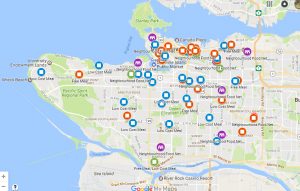
Vancouver Coastal Health has been a pioneer in the field of food-asset mapping.
Enter: the “food asset map”. Basically, the intention behind developing this tool is to create a resource with a user-friendly interface (Google Maps) that highlights the agri-food assets existent in the mapped areas. The definition of “food asset” broadly encapsulates “places where people can grow, prepare, share, buy, receive or learn about food” (Vancouver Coastal Health, 2014).The truth is, we don’t really know if food asset maps are useful at this point in time, playing on the motif of uncertainty that is tacit within community work, but we look forward to learning from this very hands-on, engaging experience and informing future asset-based community work!
Table Matters is a community-based organization situated on the North Shore (this includes: the District of North Vancouver, the City of North Vancouver, the City of West Vancouver, and Bowen Island) with a commitment towards improving community food security. We will be working closely with them over the next few months to find and develop the food assets that will eventually end up on a community food map. Our approach towards this project, still in its initial stages, may set the precedent for years to come.
Our team was brought together through our collective interest in the North Shore food system, a love for mapping, and a desire to understand food assets and bring light to these in the community. Each of us brings unique talents and knowledge to the table, an advantage for tackling this project together. Our objective is to bring an accurately drawn North Shore food asset map to life, in hopes that it will be a useful resource for community members and community partners alike.
First Impressions
On a fiercely sunny January 23 afternoon, the group met with the community partners from Table Matters for the first time. The North Shore welcomed us with silhouette vistas of the downtown core and the calm of a sun-spangled Vancouver Harbour. We met with Jenn, from Table Matters, and Sam, an LFS graduate and former LFS 350 TA, and were introduced to the foundations of our project. Although Table Matters may tend to contrast Vancouver Coastal Health in its vociferous dedication to sustainable food systems, their approach to food asset mapping is deliberately paralleled to Vancouver Coastal Health. Jenn reasonably pitched the merits of accessibility of information in having consistency between municipalities in Metro Vancouver.
There is an ostensible advantage towards approaching a community project with only a menial understanding of what to expect, if we choose to acknowledge it. Starting with a blank slate puts us in a position that requires us to engage in one powerful (and altogether underrepresented) behavior: listening. Ernesto Sirolli warns about the dangers of “experts” entering a community with a plan that neglects the voices of the community itself. This approach is prone to failure, and may have a deleterious impact on the community (TED, 2012). Our plan, then, has been formulated largely around the instruction provided by our community partner, whom is more qualified to respond to the specific needs of the community through experience and engagement.
Why do community development experts fail when they impose their generalizable models on specific communities? Part of this can be explained by Mathie and Cunningham, (2003), who emphasize the importance of an “asset-based” approach over a “needs-based” one. A needs-based approach focuses on what a community lacks, often with the unencumbered side-effect of degrading community morale. Working within the framework assigned to us by the community promotes a sense of agency. This “asset-based” approach is contributing to an increasingly sonorous understanding of why development projects have an alarmingly high failure rate.
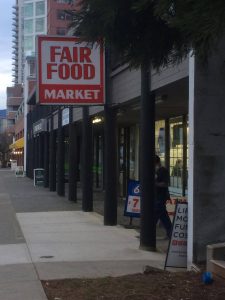
Fair Food Market represents a particular type of food-asset offering subsidized grocery items to Lonsdale community members.
Much of Jenn’s excitement in this assignment echoed her desire to procure data on previously undocumented food assets in North Vancouver. Acknowledging North Shore’s geographical limitations to food production and its smaller emphasis on community food systems (relative to Vancouver), Jenn remained optimistic about the existing food assets and community engagements (some of which have surely yet to be discovered!). We believe this reflects Jenn’s commitment to Asset-Based Community Development (Mathie and Cunningham, 2003)
There is one more concept we wish to explore more throughout this project (last one, we promise), an ideology called “food justice”. As it may, food justice is sort of like the lovechild between “food security” and “social justice”. Dixon (2014) states that sometimes, a “master narrative” can detract from the realities of those less fortunate. With much of our group from North Shore, we acknowledge that beneath North Shore’s perception of affluence, there lies potential for food insecure households. For example, the city of North Vancouver has more single parents than mainland Vancouver, an indicator of food insecurity in Canada (CNV, 2016). Succumbing to the notion that all of North Shore is rich would effectively silence those most vulnerable.
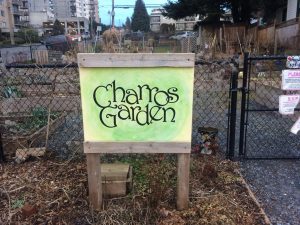
Charros Garden is a wonderful example of communities taking charge of their own food production towards greater food security and food sovereignty.
After Jenn had left us, we visited some of the known food assets that were within walking distance from our meeting spot in Lower Lonsdale. Within blocks, we were exposed to a mixed bag of different food assets: from a convenience store that sells onions to a startup that sells luxury balcony micro-gardens. We also visited a community garden, although it appeared to be in a state of dormancy given the winter months. Our excursion raised a number of questions that we hope to address by the end of term: what food assets will be overlooked due to seasonality? Does a food asset have to provide nutritious food? How does one go about identifying food assets that have not yet been documented?
Maybe our team of superheroes can help find the answers!
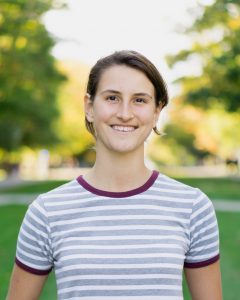 Iva Jankovic is a 3rd year Global Resource Systems major studying Urban Planning and Urban Food Security. She is an avid adventurer who loves hiking, biking, backpacking, and exploring the city through the lens of a camera or with a sketchbook in hand. Despite this, Iva is also a homebody, who loves gardening, cooking, and reading. She is excited to take on this project to hone her mapping skills and better understand food and culture in the North Shore!
Iva Jankovic is a 3rd year Global Resource Systems major studying Urban Planning and Urban Food Security. She is an avid adventurer who loves hiking, biking, backpacking, and exploring the city through the lens of a camera or with a sketchbook in hand. Despite this, Iva is also a homebody, who loves gardening, cooking, and reading. She is excited to take on this project to hone her mapping skills and better understand food and culture in the North Shore!
 Maleknaz Abrishami, Naz for short is a third year FNH student. Naz loves spending time out in the nature with her dog and traveling to new places. She is currently working as a pharmacy assistant at Coal Harbour Pharmacy. Naz believes that this project is a good opportunity for her to get to know the community she lives in better also spot the whereabouts of different community food assets on the North Shore area.
Maleknaz Abrishami, Naz for short is a third year FNH student. Naz loves spending time out in the nature with her dog and traveling to new places. She is currently working as a pharmacy assistant at Coal Harbour Pharmacy. Naz believes that this project is a good opportunity for her to get to know the community she lives in better also spot the whereabouts of different community food assets on the North Shore area.
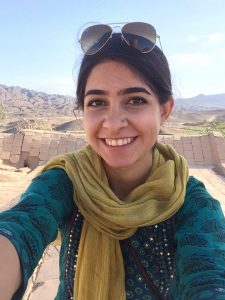 Parisa Roofigari is a 2nd year FNH student who loves travelling and music or any type of art that gets her connected with her soul! She is interested in human behaviours and its impacts on the environment and nature. Parisa hopes that this project will teach her how to apply the knowledge she gained from LFS 250; teamwork, systems thinking, sustainability, etc. in real life and, also, as a person who lives in North Shore community, have a broader understanding about the food assets existing in my neighbourhood.
Parisa Roofigari is a 2nd year FNH student who loves travelling and music or any type of art that gets her connected with her soul! She is interested in human behaviours and its impacts on the environment and nature. Parisa hopes that this project will teach her how to apply the knowledge she gained from LFS 250; teamwork, systems thinking, sustainability, etc. in real life and, also, as a person who lives in North Shore community, have a broader understanding about the food assets existing in my neighbourhood.
 Miko David is a 3rd year student majoring in Nutritional Sciences. Aside from studying for his courses, he spends most of his time working out and playing his electric guitar. His goal in life is to attain self-perfection, continuing to better himself in every aspect slowly in the process. Despite living in the North Shore for a few years, Miko feels that he hasn’t really been exposed to its community and would like to use this project as a good opportunity for him to get connected to the North Shore community as well as build a proper understanding about the food assets in the area he lives in.
Miko David is a 3rd year student majoring in Nutritional Sciences. Aside from studying for his courses, he spends most of his time working out and playing his electric guitar. His goal in life is to attain self-perfection, continuing to better himself in every aspect slowly in the process. Despite living in the North Shore for a few years, Miko feels that he hasn’t really been exposed to its community and would like to use this project as a good opportunity for him to get connected to the North Shore community as well as build a proper understanding about the food assets in the area he lives in.
 Amirparsa Ebrahimi (Parsa for short) is a 3rd year student in FNH major. Alongside being a student he is competitive soccer player for Paykan FC in Burnaby Men League, and therefore he spends most of his time apart from University practicing and playing games for his team. Amirparsa is looking forward to learning about sustainability around his neighbourhood as he lives in North Vancouver as is part of the community that his group are basing their project around. It will be a great information for him personally to know all the food assets active around his home area.
Amirparsa Ebrahimi (Parsa for short) is a 3rd year student in FNH major. Alongside being a student he is competitive soccer player for Paykan FC in Burnaby Men League, and therefore he spends most of his time apart from University practicing and playing games for his team. Amirparsa is looking forward to learning about sustainability around his neighbourhood as he lives in North Vancouver as is part of the community that his group are basing their project around. It will be a great information for him personally to know all the food assets active around his home area.
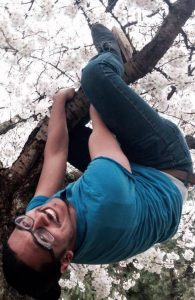 Abdo Souraya is a transfer student in his second year at UBC. He is a prospective Global Resource Systems student, interested in integrating the applications of nutrition with the socioeconomics of the food system. Abdo hopes to use this integration to influence food policy, advocating for food justice and environmentally sustainable modes of production. Food mapping with Table Matters amalgamates Abdo’s desire to influence community food systems with his affinity for exploring unfamiliar territories.
Abdo Souraya is a transfer student in his second year at UBC. He is a prospective Global Resource Systems student, interested in integrating the applications of nutrition with the socioeconomics of the food system. Abdo hopes to use this integration to influence food policy, advocating for food justice and environmentally sustainable modes of production. Food mapping with Table Matters amalgamates Abdo’s desire to influence community food systems with his affinity for exploring unfamiliar territories.
So great to meet you all and I really love your initial thoughts and reflections here! Thank you for working on our project – I’m really looking forward to seeing what you uncover and learn 🙂